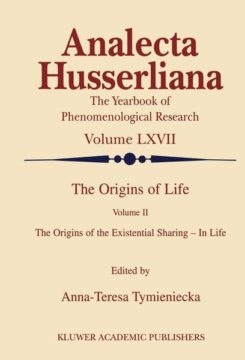Inaugural Lecture. The Origins of Life: The Existential Senses of Sharing-in-Life – Vital, Societal, Creative a Radically Novel Platform. Section I: Transitions of Sense: From the Vital Towards the Existential/Societal Sharing in Life. Atom and Individual; H. Matthai. Logos and Ethos in the Thought of Anna-Teresa Tymieniecka (the Aspect of `Beginning‘); M.P. Migón. Perception and Perceptibility of Living Beings. An Attempt to connect Phenomenology and Ethics; J.E. Hafner. Life, Person, Responsibility; A.A. Bello. Values within Relations; L. Pyra. Creativity and Everyday Life – Ricoeur’s Aesthetics; R.D. Sweeny. Section II: The Surging of the Intentional Platform of Life. The Human Arts and the Natural Laws of Bios: Return to Consciousness; P. Mróz. The Phenomenon of Loneliness and the Meta-Theory of Consciousness; V. Borodulin, A. Vasliev. Jung’s Concept of Individuation and the Problem of Alienation; M. Zowislo. `Human Dignity‘ as `Rationality‘ – The Development of a Conception; J.J. Venter. On Emotion and Self-Determination in Max Scheler and Antoni Kepinski; M. Pyka. The Paradoxical Transformation of Existence: on Kierkegaard’s Concept of Individuation; A.C. Canan. Multiple Persons in Kierkegaard’s Pseudonymous Authorship; V. Vevere. Section III: The Emergence of the Creative Sphere of Sharing in Life. Human Existence as a Creative Process (A Commentary on Anna-Teresa Tymieniecka’s Anthropological Reflection); M.A. Cecilia. The Methodologies of Life, Self-Individualization and Creativity in the Educational Process; R.A. Kurenkova, et al. Stimuli to Invention: New Technologies, New Audiences, New Images; D.G. Scillia. Stefan Zweig and his Literary Biographies; C.Berthold. The Artistic Event in the Space of Life as an Effect of the Interaction of Instincts, Feelings, Images and Spiritual; J. Slosarska. Reflections on the Everlasting and the Transient or the Road to the `Freed Field of Light‘; R. Kulis. Death and Ontology; E. Szumakowicz. Sein als `Position‘ und Ereignis &endash; Kants These über das Sein und Heidegger; T. Shikaya. Section IV: The Spirit of Creativity Soaring Towards the Sense of Beauty and Transcendence. Chinese Gardens: The Relation of Man to Nature in Seventeenth-Century French Culture; M. Kronegger. Life: The True, The Good, and The Beautiful. A Comparative Study of Greek and Pre-Qin Philosophies; L. Qingping. Towards an Aesthetics of Nature: Merleau-Ponty’s Embodied Ontology; M. Van den Bossche. Ontology and Poetry (The Principles of Being of Creation); I.S. Fiut. Heaven’s Angels with Grinding Organs: John Ruskin’s Idea of Life; E. Supińska-Polit. Phenomenology and the Cubist Space; Z. Majewska. Du mortel à l’impossible éternel: La transcendence de la mort; J. Sivak. Section V: Time, World, and Hermeneutics. The Phenomenon of the Future as it was Constituted by Kierkegaard, Husserl and Heidegger; C. Bjurvill. Time as Viewed by Husserl and Heidegger; A. Pawliszyn. Postmodernism is Existential Phenomenology; J.I. Unah. Postmodernism as a Completion of Phenomenology and Hermeneutics; P. Gulda. The Human Being in the Liberal-Democratic Epoch; T. Buksiński. Six Para-Philosophical Exercises in Latvian Euro(onto)poiesis; A. Zunde. Appendix. Index of names.
- Veröffentlicht am Samstag 13. Oktober 2012 von Springer Netherland
- ISBN: 9789401057868
- 502 Seiten
- Genre: 20., 21. Jahrhundert, Hardcover, Philosophie, Softcover
